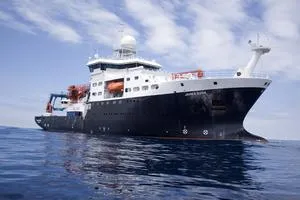
Today the Royal Research ship (RRS) James Cook will embark on an expedition to discover new sources of the rare metals, critical for low carbon technologies.
This forty-day investigation will use robotic submarines, autonomous seafloor instruments and drilling to answer questions about what controls the formation of these marine mineral deposits on the floor of the North East Atlantic.
Chief Scientist, Dr Bramley Murton from the National Oceanography Centre (NOC), who are leading this expedition, explains the thinking behind the research: “The fate of modern civilization and our ability to secure a low-carbon future depends on the supply of raw materials including base metals and elements critical to new technologies. While the demand for raw materials has grown exponentially, the terrestrial grade has diminished and threatens global supply.”
Recognising these needs, the Natural Environment Research Council (NERC) has initiated a major research programme towards securing the supply of critical elements. As part of that wider programme, the NOC is leading a £4.2-million collaborative project, called MarineE-tech, to enhance understanding of the processes controlling the cycling and concentration of ‘E-tech elements’ in marine mineral deposits.
Also funded through the São Paulo Research Foundation, Brazil, MarineE-tech will use robotic submarines, autonomous seafloor instruments and drilling to answer question about what controls the formation of marine mineral deposits.
During several research cruises over the next few years, and in collaboration with the University of Sao Paulo, Murton’s team will study the controls on cobalt and tellurium concentration and deposit thickness across submerged volcanoes including the Tropic Seamount in the NE Atlantic, and the Rio Grande Rise in the SW Atlantic. They will explore the potential impact of mining these deposits on seafloor environments by the impact of sediment plumes on neighbouring ecosystems.
Project partners at the University of Bath will also explore new methods the recovery of E-tech elements from marine mineral deposits using low carbon extraction technologies such as ionic liquids, nano-fibres and bio-processing.
These core objectives will help inform the regulatory framework where best practice for sustainable exploitation of marine mineral resources is yet to be established. We will explore governance and sustainability issues around deep-sea mineral deposits, especially those involving small nation island states and with overseas developing economies.
MarineE-tech’s project partnerships span industry, academia and policy makers and includes: the University of San Paulo, the University of Bath, the British Geological Survey, South Pacific Island Communities, the United Nations’ International Seabed Authority, HR Wallingford, Marine Ecological Surveys Ltd., and Soil Machines Division Ltd, Gateshead.